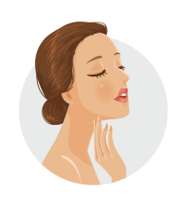Cure For Stinky Feet And Smelly Shoes
August 19, 2021 2021-08-19 12:59Cure For Stinky Feet And Smelly Shoes
As an Amazon associate, Dermatocare earns from valid purchase made by clicking on the affiliate links in this blog.
Cure For Stinky Feet And Smelly Shoes
Written By Dr Surbhi, MD Skin
Last updated: 24/07/21
Do you know that sweating is the most important reason for smelly feet? In one day, each foot can produce more than a pint of sweat. There are more than 250,000 sweat glands in each foot which are far more than anywhere else in the body.
I free my feet from tennis shoes,
it feels so cool and fine.
But as I tread across the room,
I leave a scent behind.
I love it when I take them off,
the air feels so delish.
But then I hear my sister yell,
“Your feet smell like dead fish!”
“Put on your shoes, I’m gagging bad!”
My sister’s such a fink.
Before she feigns a faint she cries,
“I’m passing out from stink!”
Shirlee Curlee Bingham…….
Does this story relates to you??? Let us unveil the some of the facts and tips to control stinky feet and smelly shoes.
What causes smelly and stinky foot?
Your feet are among the most perspiring parts of the body. At any temperature or time of year, anyone can get sweaty feet, but teenagers and pregnant women are especially prone because hormonal changes make them sweat more.
People get smelly feet when the perspiration has no where to evaporate – but it is not the sweat that causes the foot odor, Bacteria like cornyebacteria, dermatophilus, actinomyces and micrococcus that lives on the skin, they have enzymatic property that eats the feet’s sweat, producing isovaleric acid, causing the odor. Also, Athlete’s Foot, which is a skin infection caused by a fungus, can cause smelly feet.
What causes smelly shoes and stinky foot?
Smelly and sweaty feets are most commonly caused due to sweat retention and immersion.
- They are more prevalent in industrial workers wearing rubber shoes, athletes who sweat a lot in shoes and soldiers whose feet are continually wet.
- Wearing the same shoes every day can lead to sweat retention in shoes. Also, feet become smelly if sweat soaks into the shoes and you wear them again before they are dry.
- Wet shoes are the perfect niche for bacteria, causing enzymatic breakdown producing pungent odour.
- People with poor personal hygiene, not taking care of feet and nails also suffers from stinky feets.
- A medical condition called hyperhidrosis, in which people tend to sweat a lot more than normal, also leads to excess sweat retention and eventually stinky and smelly feets.
- Some physiological conditions such pregnancy and teenagers are more prone to sweating because of hormonal changes.
- Consumption of alcohol also increases the perspiration of feet.
What are tips to stop/cure smelly and stinky foot?
There are certain tips and home remedies which help cure the smelly and stinky feet:
- Most importantly, wash and dry your feet daily with an antibacterial soap.
- Use wool or cotton socks and change them daily. Socks should be washed inside out.
- Wear open toe sandals in summer and go barefoot at home in the evenings.
- Use antiperspirant foot spray at night.
- Avoid wearing same pair of shoes two days consecutively; wear different shoes on successive days so they have at least 24 hours to dry out.
- Sprinkle antifungal medicated powders on your socks and shoes daily before wearing them.
- Cut down on alcohol intake.
What are home remedies for smelly shoes and stinky feet?
- Epsom salt: Mix two tablespoons of Epsom salts in two quarts of warm water, dip your feet for 10 to 15 mins daily. It not only helps to clean and freshen up the feet but also this solution keep feet dry.
- Aluminum chloride liquid or spray prevents sweaty feet. It is recommended to apply in the evening, before going to bed and wash it off the next morning.
- Baking soda: This stuff is highly alkaline which kills the bacteria. Sodium bicarbonate or baking soda also seems an efficient and cheap way of reducing the number of bacteria in shoes and socks. It is recommended to put it both in the shoe and in the socks. After a few days, the odor should have been reduced or removed.
- Soak your feet in one1 part vinegar and two parts water, this helps in control of sweating.
When should I visit a dermatologist for the smelly and stinky foot?
See your dermatologist if simple measures to reduce your foot odour are not working, or if you’re worried that your level of sweating is abnormally high.
What is the treatment for smelly shoes and stinky feet?
- Topical 20% aluminium chloride hexahydrate in anhydrous ethyl alcohol may help to reduce the hyperhidrosis. The solution is applied at night and allowed to dry. It should be used daily until the condition is brought under control.
- Formaldehyde as 4% solution might reduce hyperhidrosis in addition to antiseptic action. Soak for 10 – 15 mins.
- Iontophoresis is used for palmoplantar hidrosis if formaldehyde fails.
- Topical 5% buffered glutaraldehyde used three times weekly till symptomatic and the 2 or 2.5% maintenance treatment as required.
- Topical clotrimazole 1% cream twice daily. Topical clindamycin 2% solution twice daily and topical aluminium chloride hexahydrate each evening for eight weeks works wonders.
THIS ARTICLE IS AUTHORED BY DR PRIYANKA AGGARWAL, MD SKIN
Dr Priyanka is working as a consultant dermatology and cosmetology at Kalinga hospital and VLCC , Bhubaneshwar. She has recently completed one year of Senior Registrarship in the Department of Dermatology, LTMMC and Sion Hospital, Mumbai. She has special interest in vitiligo, melasma, cryotherapy and lasers. She has experience in performing cosmetic procedures such as chemical peels, cryotherapy, radiofrequency ablations, mesotherapy, lasers such as diode for hair removal, Q switch Nd YAG, ultrapulse CO2, triactive, Botox and fillers, vitiligo surgeries such as melanocyte stem cell transplant, punch grafting and split skin grafting. You can ask her queries at [email protected] and [email protected]
ROUTINE FINDER
Get free dermatologist-recommended regime by choosing your skin or concerns.

FACE

HAIRS

CHILD

BODY




